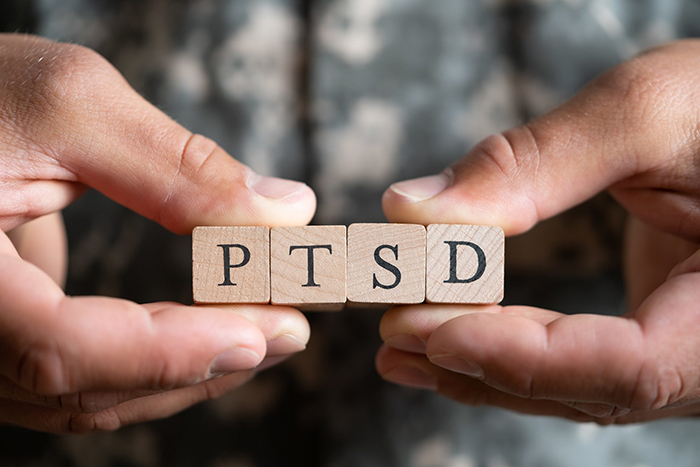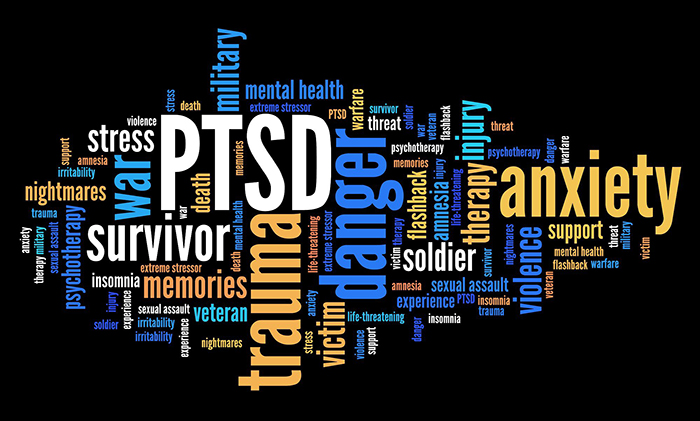There are many misconceptions about post-traumatic stress disorder (PTSD). Too often, these fallacies keep those who need help from seeking it. The Emory Healthcare Veterans Program (EHVP) hopes to dispel these myths and share a message of hope with all who are struggling with invisible wounds: Treatment works, and you CAN transform your life.
Myth #1: Having PTSD Means I’m Broken
Fact
PTSD is a response to traumatic events. Humans are hardwired to remember life-threatening memories for our long-term survival. You’re not broken, you’re human.
An estimated 70% of people will experience a potentially traumatic event, and about 12 million adults in the United States will be diagnosed with PTSD in any given year.
Traumas such as combat, sexual assault, natural disasters, severe and traumatic illness, and a physical attack are all experiences that can become the stuck memories of PTSD. Trauma survivors with PTSD are haunted by these experiences, impacting everything from sleep to relationships.
Most people start to feel better after a few weeks or months, but for some, the symptoms remain, or they may come and go over time. If you continue to experience symptoms of PTSD several months after the traumatic experience, it may be time to reach out for help.
Myth #2: Only Combat Veterans Get PTSD
Fact
Anyone who has experienced a traumatic event may struggle with symptoms of PTSD.
There are many ways a veteran or service member may experience a traumatic event outside of combat. For example, training accidents, exposure to toxic substances, sexual assault, or harassment can happen outside of combat yet be traumatic.
Service members and veterans can also experience trauma in their civilian life, such as physical or sexual assault, natural disasters, or childhood trauma. Any of these experiences can become the stuck memories of PTSD. Trauma survivors with PTSD are haunted by these experiences, impacting everything from sleep to relationships.
Myth #3: No One Understands What I’m Going Through
Fact
It’s easy for people with PTSD to feel isolated or misunderstood. Although you may feel as if no one else will understand what you’re dealing with, the Emory Healthcare Veterans Program team specializes in treating veterans and service members who have experienced trauma. They empathize with your suffering and are well-equipped to help you through it when you’re ready.
Myth #4: I Don’t Deserve Help Because Others Have it Worse Than Me
Fact
If you are having a hard time, you deserve help. Even if others are in worse shape, it doesn’t change your suffering. Invisible wounds are just as deserving of help as visible wounds. Emory Healthcare Veterans Program is here to assist any veteran or service member who could live a better life.
Myth #5: I Don’t Want To Be Seen as Weak
Fact
There is no weakness in asking for help. Few things require more strength than taking ownership of your life and future.
Myth #6: Therapy Requires Too Much Time and Money
Fact
You don’t need to be in therapy for the rest of your life to see results. EHVP’s Intensive Outpatient Program is free, confidential, and provides an entire year’s worth of treatment in just two weeks. You can participate in the program at our clinic in Atlanta, Georgia, or from the comfort of your own home via telehealth if you’re in an eligible state.
Myth #7: The Memory Is Too Painful and I Don’t Want to Talk About It in Therapy
Fact
It’s understandable to think that the process of remembering trauma will be unbearable — but it takes a lot of energy and effort to avoid a memory.
Trauma must be emotionally processed so it can become less painful. Therapy is similar to the grieving process. When a loved one dies, it’s highly distressing, but by expressing that hurt, it gradually becomes less upsetting. Eventually, we can think about that person without crying, although the loss will always be sad. Talking through your traumatic experience in a therapeutic setting will help you process the trauma and heal your invisible wounds.
Myth #8: You Can Only Manage Your PTSD, Not Treat It
Fact
High-quality and effective treatments for PTSD exist, and you can transform your life from invisible wounds. Evidence-based treatments such as Prolonged Exposure therapy and Cognitive Processing Therapy (CPT) are proven to be successful for those struggling with invisible wounds.
After treatment, many patients have told us that they feel like the person they were before the trauma, and they didn’t think that was possible. One Intensive Outpatient Program graduate said the treatment helped him enjoy being with his friends and family again, saying that he felt like he was back to being himself after treatment.
Myth #9: PTSD Is All in My Head
Fact
PTSD is a real and serious disorder that requires accurate diagnosis and treatment.
PTSD can feel like it’s all in your head with the intrusive memories; however, the impact of PTSD goes beyond just your brain and includes changes in how your body reacts to stress and other routine processes. These changes can even result in medical problems over time. Taking your life back from PTSD can be good not only for your head but also for your body.
Myth #10: I’ll Always Have PTSD
Fact
We want you to know that there is hope, and you don’t have to struggle with your PTSD symptoms on your own. Effective treatments for PTSD are available.
The Emory Healthcare Veterans Program provides free and confidential care for post-9/11 veterans and service members, regardless of location, discharge status, deployment history, or length of service. Our two-week, evidence-based Intensive Outpatient Program or our traditional outpatient treatment will help you transform your life and return to the things you love.
Tomorrow Can Be Better
Reconsidering your misconceptions about PTSD and therapy is the first step toward healing. Tomorrow can be a better day, and the Emory Healthcare Veterans Program is here to help.
About Emory Healthcare Veterans Program
Emory Healthcare Veterans Program treats conditions such as post-traumatic stress disorder (PTSD), traumatic brain injury (TBI), military sexual trauma (MST), anxiety, and depression related to military service. Treatment is free and confidential for eligible post-9/11 veterans and service members living anywhere in the United States, regardless of discharge status, deployment history, or length of service. Our two-week Intensive Outpatient Program and our traditional outpatient treatment are offered in-person at our clinic or via telehealth in eligible states.
Treatment works, and we are here to help. Call 888-514-5345 or complete our confidential online form to learn more.




